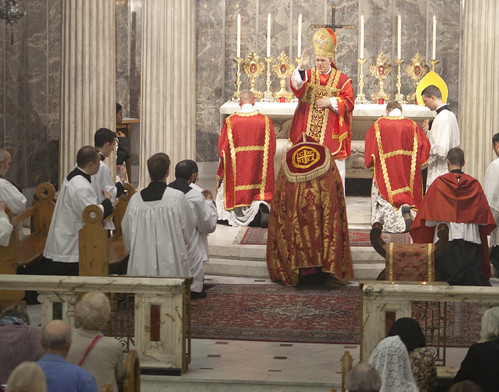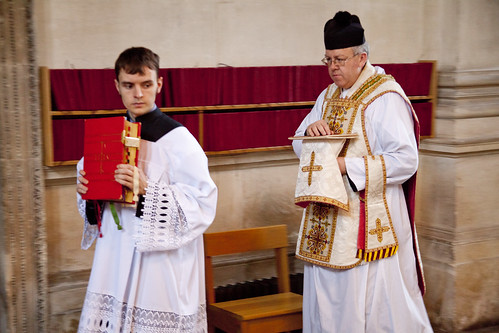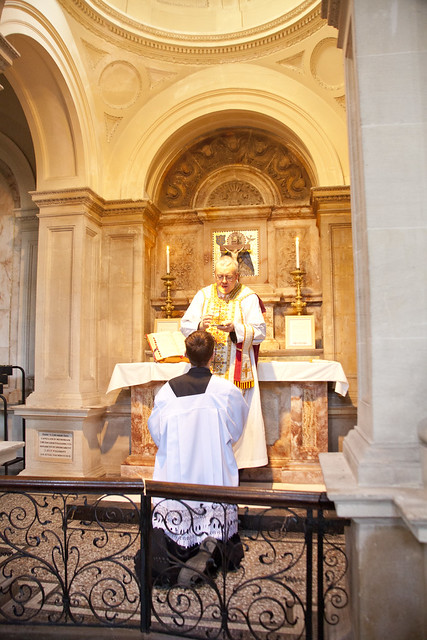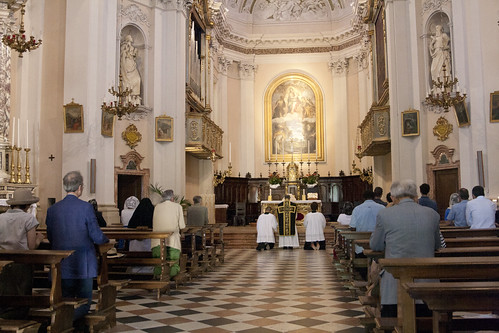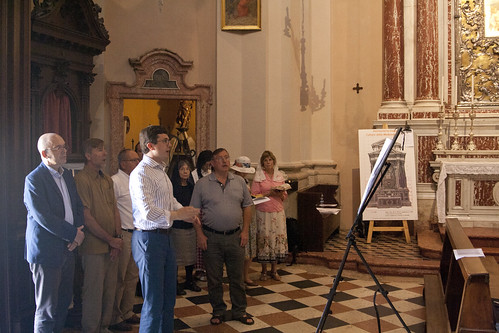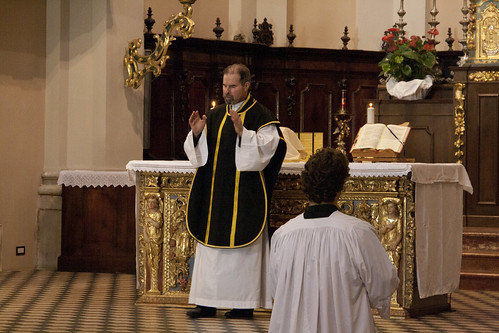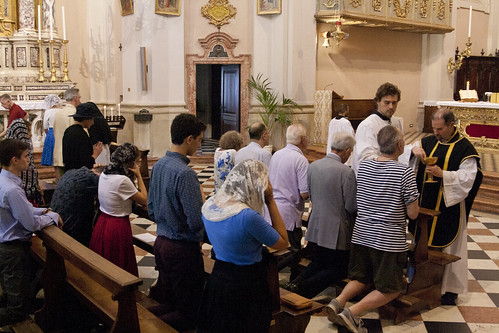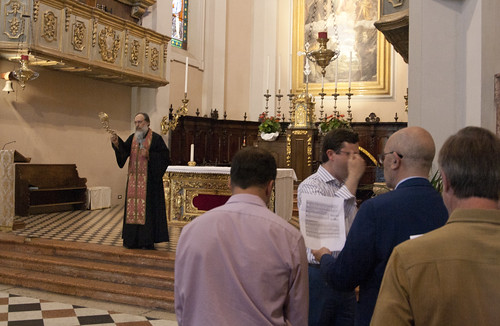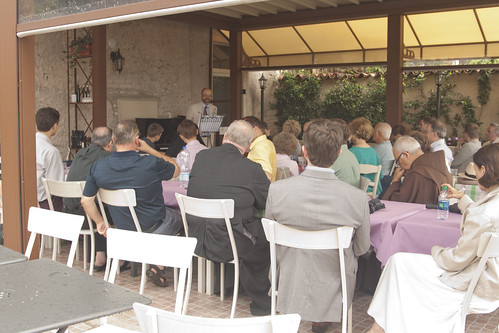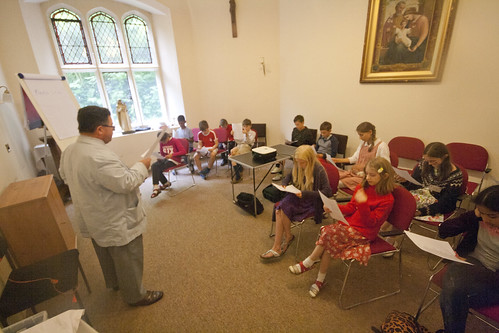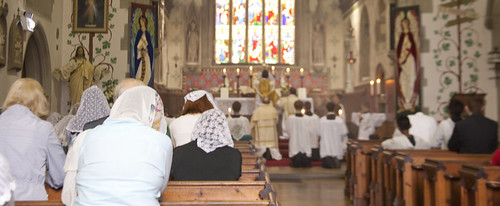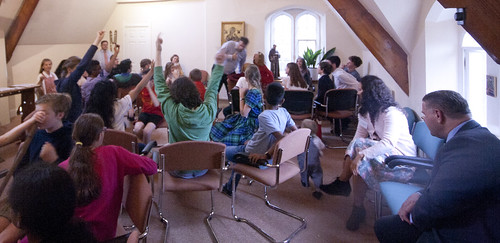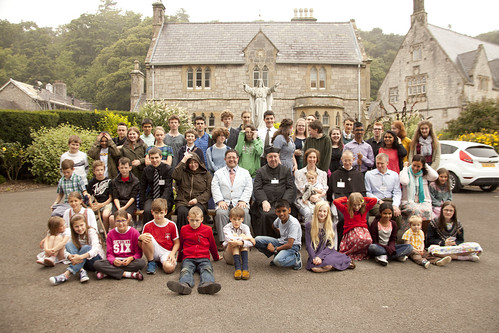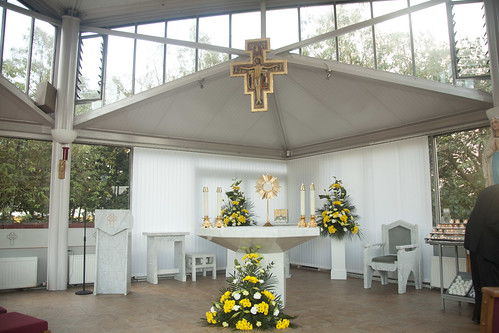Chairman's Blog
Are things simply going to get gradually better? Or should we hang some bishops?
I was a little startled to read over the last 24 hours two calls for bishops to be hanged. One was from Matthew Walther, writing for the non-Catholic, mainstream magazine The Week. Walther is no anti-clerical fanatic, but a faithful Catholic. He is writing with a touch of hyperbole, perhaps, but he is making a serious point.
McCarrick obviously should not have been elevated to the cardinalate in 2001. He should not have been made archbishop of Washington. He should not have been simply "removed from public ministry" a month ago, but defrocked. In the time of St. Pius V, a cleric found guilty by an ecclesiastical tribunal of McCarrick's crimes would have been publicly executed by the secular authorities.
That would have been fitting. Indeed, I cannot really aspire to some kind of quasi-journalistic neutrality here. I believe that anyone who abuses a child should be put to death, priest or layman, man or woman. I hate child abusers with a perfect hatred, one that rests uneasily in my heart with the imperative of forgiveness enjoined by Our Lord.
This is unfortunately no longer even a remote possibility in the United States, thanks to the Supreme Court's decision in Kennedy v. Louisiana. At the very least, however, McCarrick should be prosecuted aggressively to the furthest extent possible by the laws of the various states in which his alleged crimes were committed.
The other call for the hanging of bishops was in relation to Anglican bishops. You know, those harmless, bumbling, decorative appendages of Britain's delightfully antiquated constitution. The writer, the Anglican cleric Jules Gomes, is a provocateur, but what he's saying is not simply a joke.
Lord Acton argues that those seated on thrones of power should not escape justice. ‘You would spare these criminals, for some mysterious reason,’ he tells Bishop Creighton. ‘I would hang them, higher than Haman, for reasons of quite obvious justice; still more, still higher, for the sake of historical science.’
So far, the IICSA is exposing the corruption of absolute power in the Church of England. Lamentably, we can’t hang corrupt bishops. Neither can we strangle the last bishop with the entrails of the last politician. We can do far more and pray Mary’s Magnificat that God will ‘pull down the mighty from their thrones and exalt those of humble estate’.
Those of my readers who are momentarily forgetful can refresh their memory of the edifying end of Haman in the Book of Esther here. The point is that he was hanged on a very high scaffold indeed: one he had intended for the righteous Mordecai.
The news about Cardinal McCarrick has sent the Catholic commentariate into a kind of furious despair, and as Gomes reminds us, similar things are unfolding in the Anglican world. This parallels the feelings of many in the secular sphere over the 'MeToo' scandals. It is because it so long, now, since the abuse scandal broke, and since those in charge agreed to strict new principles, and told us all that things would be different from now on. It comes as no surprise to those watching things carefully that things have not, really, changed very much, but it is still indescribably frustrating.
What is clear now is that the earlier media circus about clerical sex-abuse, which focused on people like Cardinal Groër of Vienna, Cardinal Law in Boston, and Cardinal O'Brien in Edinburgh, was highly selective. As Philip Lawler pointed out long ago, Law was convicted of covering up clerical abuse, a crime undoubtedly committed by many other American bishops. Yet no other US bishop was charged with this. (A few were charged with being abusers themselves.) O'Brien and Groër were brought down for relationships with seminarians. Yet it turned out that Bishop Conry's adulterous affairs were an open secret for decades, and Cardinal McCarrick and Archbishop Weakland had been semi-publicly paying off former lovers/ victims using Church funds.
Why were those three, and a few others, targeted? Media people sometimes say that they don't like to expose 'consensual' sexual relationships. But there is no substantial differences, as far as consent is concerned, between O'Brien and Groër, on the one hand, and McCarrick and Weakland, on the other. No: the difference is that the people brought down were regarded as theologically conservative. O'Brien had a mixed theological record but the occasion for his downfall was his opposition to same-sex marriage.
The media's preference for exposing conservative politicians and other public figures is equally easy to illustrate. (Compare the treatment of Trump's bragging and Bill Clinton's interns.)
I wonder if this pattern reassured some of the remaining abusers that they were safe if they played up their liberal credentials. But things have taken on a momentum of their own, one which is harder for the 'legacy' media to control. The abuse crisis has been unimaginably painful for the Catholic laity, who are far more even-handed in their condemnations than the mainstream media, and the weight of testimony and other evidence was bound to catch up with other prolific abusers in the end. To be reassured that everything is going to be different now, and then see a series of scandals coming out all over again, is breaking the laity's patience. It is particularly galling to recall that McCarrick was personally involved in the response to the abuse crisis. And that the other bishops saying the warm words were surely perfectly well aware of the irony of the situation.
What it means, alas, is that it is not just the abusers themselves who cannot be trusted. It is the great majority of the US bishops, bishops who did nothing, said nothing, went along with and supported the official response and the business as usual charade. (A notable exception was Bishop Bruskewitz of Lincoln, Nebraska, who refused to comply with the 'Dallas Charter', the absurdly misconceived, and as we now know, deeply hypocritical, official response to the crisis.)
Bishop Thomas Tobin of Providence, Rhode Island, regarded as a conservative, learnt this the hard way on Twitter. He tweeted a few days ago:
Despite the egregious offenses of a few, and despite the faults and sins we all have, I’m very proud of my brother bishops and I admire and applaud the great work they do everyday for Christ and His Church.
I can't screen-shot it because he has now deleted his entire account. He said that Twitter was distracting him from his spiritual life and was an occasion of sin for others. What actually happened, as you can still see by searching for his old handle @bishoptjt and from this article, is that his sentiment was greeted by an overwhelming number of very polite but outraged responses from Catholics. I myself pointed out that is it not the offences of the few which are the problem, now, but the silence and complicity of the many.
I feel a little sorry for Bishop Tobin, because this kind of establishment boiler-plate has gone done perfectly well for decades. It is a little curtsey from a bishop with a conservative reputation to the dominant liberals of his conference. I says 'It's ok, I'm not going to rock the boat'. And it suggests, without quite saying it, that not rocking the boat is what Jesus would have wanted, and that lay conservative Catholics shouldn't rock the boat either.
This is not the moment for such sentiments, however, and it says a lot about the force of his ingrained habits of mind that Tobin thought it would work.
One should be wary of attributing to 'the bishops' the sins of their predecessors, but it remains true that no Catholic bishop in the United States has broken ranks to condemn the system of mutual back-scratching and cover-up which has allowed prolific abusers not only to exist but to flourish. Not all the bishops of the United States are themselves engaged in the back-scratching and covering up, but they all know about it. I'm sorry, but yes they all know about it. How stupid and ill-informed would they like us to think they are? They have seen it with their own eyes. And yet they say nothing.
Is the same true in Britain? I do not know. The fact that two of our biggest scandals have involved heterosexual adultery - Bishop Conry of Arundel and Brighton and Bishop Roddy Wright of Argyle and the Isles - may suggest that there is a slightly different pattern here. On the other hand, the Cardinal O'Brien scandal suggests a systematic problem: he was Archbishop of Edinburgh 28 years, and since he was helping himself to seminarians over that time the damage he must have done is incalculable. It is possible that something like that will revealed about an English bishop; we will have to see. I don't want to condemn anyone in advance of the evidence.
The loss of trust, however, cannot be contained: if it is lost in America, it will have its effect all over the world. The attitude of conservatives in the hierarchy, and many conservative laity, has been that if they quietly do their work they can do good, and that because of (delete as appropriate) the good policies of Pope John Paul II / Pope Benedict XVI / the new generation of Bishops / young priests, things will gradually improve. That was always an optimistic assessment, and it is now clear that it is false. As I have written before, the evangelisation of our society is impossible without the restoration of the moral authority of the bishops. And that is not going to happen now without some kind of cathartic crisis. There must be a clear-out, and there must be a clear stand taken by the remaining, or new, bishops.
It is quite simple, actually. As Cardinal O'Brien demonstrated, it is impossible for bishops who are personally morally compromised to take a clear stand on the crucial issues of the day, because they will be destroyed by the people with dirt on them, with the help of a gleeful secular media. All that needs to happen, therefore, is for bishops to take such a stand. Those who cannot? Never mind talk of hanging: I'll settle for a quiet resignation.
Update: see Michael Brenden Dougherty on the 'biological solution'.
Support the work of the LMS by becoming an 'Anniversary Supporter'.
Bishop Schneider on the LMS's liturgical music
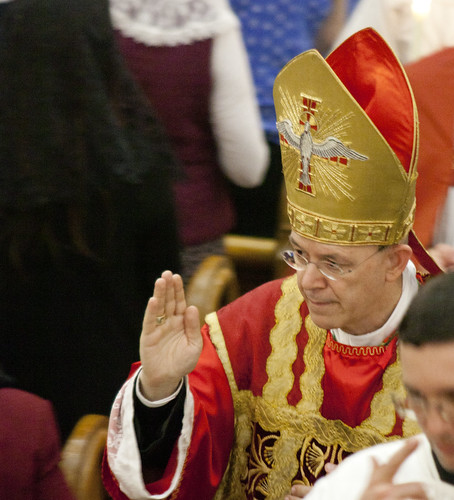 |
| Bishop Schneider in St Mary Moorfields, London |
The polyphony of this Mass, sensitively chosen for the celebration and exemplifying the great breadth of the English choral repertoire, was beautifully sung by Cantus Magnus under the direction of Matthew Schellhorn: his generous artistic contributions in the field of Sacred Music are of true value in upholding the dignity of the Sacred Liturgy.
Both the artistry of these works and the sensitivity of their execution clearly evidenced a deep love of the Sacred Liturgy – characteristics intrinsic to the English Catholic music tradition.
Thanks to the support of the Latin Mass Society under its Chairman, Dr Joseph Shaw, the authentic Catholic musical tradition of England, Our Lady’s Dowry, is fostered and kept alive to the benefit of the whole Church.
This rejuvenation of the Church through Sacred Music is greatly encouraging. In the words of His Holiness Pope Emeritus Benedict XVI [then Joseph Cardinal Ratzinger, speaking at VIII International Church Music Congress in Rome, 17 November 1985]: ‘True liturgy, the liturgy of the communion of saints, gives man once again his completeness. […] By “lifting up the heart;” true liturgy allows the buried song to resound in man once again. Indeed, we could now actually say that true liturgy can be recognized by the fact that it liberates from everyday activity and restores to us both the depths and the heights: silence and singing. True liturgy is recognizable because it is cosmic and not limited to a group. True liturgy sings with the angels, and true liturgy is silent with the expectant depths of the universe. And thus true liturgy redeems the earth.’
His Excellency Athanasius Schneider O.R.C.
Support the work of the LMS by becoming an 'Anniversary Supporter'.
Fr Mark Morris sacked as Chaplain of Glasgow Caledonian University over prayers of reparation for Pride event
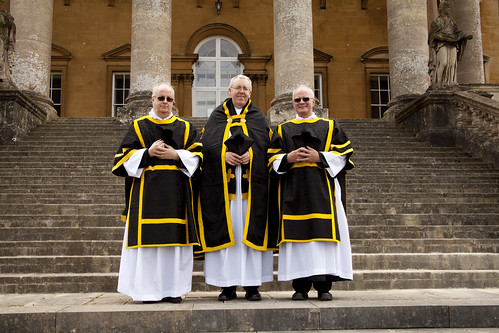 |
| Fr Morris, centre, at the Latin Mass Society Priest Training Conference at Prior Park, in 2015. |
From Church Militant:
Read the story there.
The story is both outrageous and predictable. Naturally the University authorities have no interest in the integrity of the Catholic faith or the freedom of its adherents to act on it. They have no interest in academic, aesthetic, or historical integrity either. Their only interest is in not falling out with the latest student politically correct demand, as it was over the issue of Rudyard Kipling's poem on display in Manchester University, or the former Provost of Oriel over the statue of Cecil Rhodes. As far as University administrators are concerned, students are customers, and if students wanted to be taught nothing but the collected poems of Minnie Mouse and have rainbow flags adorning every tower, they would do their best to arrange it.
I think, nonetheless, that prayers of reparation for such evils are not only morally necessary but a good way of manifesting the Faith. Anything Catholics say or do about homosexuality is going to be interpreted as homophobia, but prayers of reparation locate the issue firmly at the level of personal sin and scandal. It is insofar as Pride events are celebrations of a lifestyle characterised by sin - insofar as they are, in fact, propaganda exercises for sin - that they are problematic. And it is precisely this aspect of them that those objecting to Fr Morris' prayers are objecting to.
There will be a votive Mass of Our Lady of Guadalupe in reparation for abortion in SS Gregory & Augustine's, Oxford, at 6pm on Wednesday 28th November.
Support the work of the LMS by becoming an 'Anniversary Supporter'.
FIUV Magazine Gregorius Magnus: new edition
The fifth edition of the online magazine of the Foederatio Internationalis Una Voce (FIUV: Una Voce International) is available for free download as a pdf here.
The FIUV is the federation of all the Una Voce / Latin Mass groups around the world. It has more than 40 affiliates from North and South America, Europe, Asia, Africa, and Oceana. It was founded in 1965 and meets every two years in Rome.
See its website here.
Support the work of the LMS by becoming an 'Anniversary Supporter'.
FSSP Fundraising for the Warrington apostolate
 |
| Two of the original parish buildings, directly behind the church |
The Fraternity of St Peter were given the beautiful and impressive church of St Mary in Warrington by Ampleforth Abbey, with the agreement of the Archdiocese of Liverpool, in 2015. Sadly, however, the the church by then no longer had the buildings once associated with it, which once housed the priests serving the parish and provided facilities for parishioners.
These buildings, however, are now available for purchase. The Fraternity's work in the north of England would be transformed by re-uniting them to the church. Please help them raise the necessary funds.
-------------------------------------
Unlike other Church institutions though, we are poor. This is mostly due to the fact that we are merely eighteen years old in England, having only been established canonically in the UK in 2000. We have not yet had a generation of benefactors leaving their estate to us. The only one who did provided lasting financial stability for our first apostolate in the South. God bless her soul.
But we have…
• Time-proven tools of sanctification.
• Families and individuals increasingly eager to benefit from our ministry.
• One priest from the UK ordained every year.
Please always specify: ‘Priory Campaign’
God bless you!
Support the work of the LMS by becoming an 'Anniversary Supporter'.
A few photos from the Roman Forum
I gave a paper to the Roman Forum Summer Symposium this year, as I did last. Here are a few photographs.
The symposium takes place in the town of Gardone Riviera, on Lake Garda. We use the beautiful church of St Nicholas there. Singing at the litugies is led by David Hughes (with the stripey shirt, above), a council-member of the Church Music Association of America.
The chaplain is Fr Richard Munkelt, above.
It was particularly well attended this year, though it is not a massive event.
Fr Gabriel Diaz was also present, and as usual celebrated some of the Byzantine liturgy.
The main business of the Symposium is, of course, papers. Here's one being delivered by one of the faculty. There are two a day; the Symposium continues for two weeks. It is a remarkable get-together of traditionally minded Catholic writers and academics. The informality of the occasion creates the maximum opportunity for conversation and a general restoration of one's batteries. The event is open to all, and takes place in early July each year. Go and look at the Roman Forum Summer Symposium website for more details.
Support the work of the LMS by becoming an 'Anniversary Supporter'.
Last call for the LMS Latin Course: 30th July to 3rd August
There are still some places left!
For details and booking see the LMS website here.
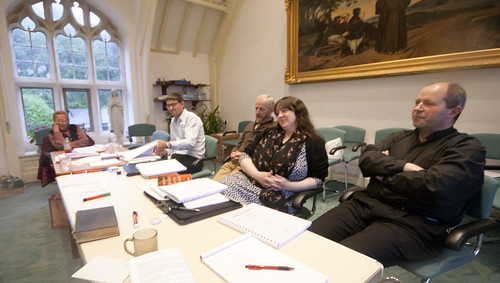 |
| Latinists at the 2017 course, which took place at Pantasaph in North Wales |
Dates: 30th July to 3rd August 2018
The Latin Mass Society’s Residential Latin Course for adults is an intensive course, taught by two experienced tutors, focusing on the Latin of the liturgy.
It is ideal for priests and seminarians wishing to improve their Latin, and all clerics and seminarians (and those about to enter seminary) enjoy a 50% discount on the course fees, which are extremely low anyway.
They are joined by lay men and women who wish to engage more closely with the ancient Latin liturgy, or do studies involving Latin.
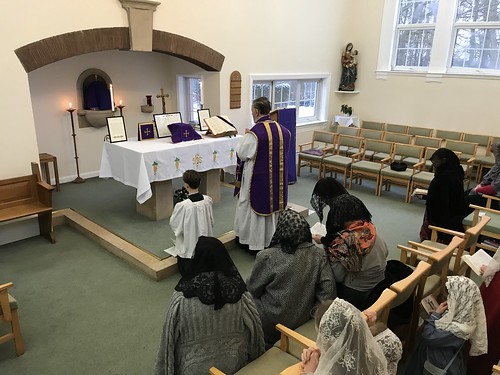 |
| Mass celebrated by Fr John Hunwicke at Boars Hill for the Guild of St Clare sewing retreat |
SSPX Oxford Mass Centre to close
 The Mass centre supplied by the Society of St Pius X in Oxford is to close. The last Mass will take place on Sunday 22nd July.
The Mass centre supplied by the Society of St Pius X in Oxford is to close. The last Mass will take place on Sunday 22nd July.
Priests of the Society have been travelling to Oxford from their base in Burghlere near Newbury.
In accordance with the policy of the Latin Mass Society I have never advertised these Masses, even though attendance at Masses celebrated by priests of the Society is permitted under certain conditions (Letter of the PCED from Mgr Camille Perl, Secretary, May 28, 1996; repeated in Protocol N. 236/98 of March 6, 1998).
This closure is something of an end of an era: this Mass centre continues a tradition going back decades. For a number of years they were celebrated by the remarkable Fr Michael Crowdy, before being formally adopted by the SSPX.
The venue of these Masses for the last 15 or so years, the North Oxford Conservative Association in Middle Way in North Oxford, is, however far from satisfactory.
I hope that before too long alternative provision, with the recognition of the Archdiocese, can be made in Oxford on Sundays: provision which, unlike the 8am Low Mass offered at the Oxford Oratory, is accessible to those living some distance away, or who rely on public transport. Although there are many more Traditional Masses being celebrated in England and Wales than in the past, it remains true that outside Oxford you have to go a long way to get to the next regular Sunday provision: Reading in the South, Birmingham in the North, Bedford to the East: each at least an hour's drive. To the West: forget it. (See this map).
The era of Catholics who wish to attend the ancient Mass having to travel long distances, attend Masses at unsocial hours or in peculiar venues, has not yet come to an end.
Support the work of the LMS by becoming an 'Anniversary Supporter'.
Last call for the SCT Summer School 29th July to 4th August
The St Catherine's Trust Summer School 2018 is taking place from Sunday 29th July to Saturday 4th August at the Divine Retreat Centre, St Augustine's Monastery, in Ramsgate, for children aged 11-18.
You can book here. There is NO FEE.
We been doing this since 2005. Our volunteer staff and chaplain, Fr Andrew Southwell, give the children an experience, not of 'organised fun', but of something more like a school. We teach them a range of subject - catechism, history, philosophy, Latin - and we have sung or High Mass, sung Compline, and the Rosary, every day. There are also various activities and outings, which vary year by year.
We have a very loyal group of repeat customers and it is annoying to have had to move the venue from North Wales to the extreme South East: sadly last year's venue, Pantasaph Retreat Centre, has closed. I hope that at least for some the new place will be more convenient. And maybe there won't be as much rain!
It is a unique and unforgettable experience, endorsed by our most critical customers: the children themselves.
You can donate to support the St Catherine's Trust here.
Support the work of the LMS by becoming an 'Anniversary Supporter'.
Some worries about Exposition of the Blessed Sacrament: Part 3
Fr Alexander Sherbrooke, in announcing perpetual exposition in St Patrick's Soho Square, reminds us of the tradition of Exposition in the Basilica of the Sacred Heart on Montmartre in Parish, established, with the church itself, as a national act of reparation. The Forty Hours devotion began as an act of reparation. What does this mean?
Benediction itself is not, primarily, an evangelising tool. It is an opportunity for us to give special honour to Christ in the Blessed Sacrament. We do this by the ceremonies, prayers, and chants, and the watching, in the 40 Hours, through the night. It creates an opportunity to do something a bit like a pilgrimage or a great act of charity, but directed towards the Blessed Sacrament specifically, in recognition of the insults against the holiness of God. It is not something we use for some other purpose. What we, like the builders of Sacré-Cœur, may hope, is that God, being appeased, will visit us and leave a blessing behind.
Let me make explicit the extension of this point to the liturgy in general. We should not use Mass to attract converts. We should celebrate Mass with all possible solemnity because it is an act of worship to God, and that should be done with all possible solemnity. We should, further, do whatever possible to excite the piety of the worshipers, to the same end. Worshipers, taking part in the liturgy, will be transformed by it; lukewarm Catholics will be made fervent; non-Catholics, even, may recognise in it the God who is makes Himself known through the liturgy. But that last effect is not what it is for. Unlike works of Catholic apologetics, unlike preaching, it is not an instrument we use to gain this goal. To make it an instrument in our plans is to undermine its very nature, something which is offered not to men but to God.
That is compatible with saying, what I have said myself often, that the liturgy has a place in the New Evangelisation. There's nothing wrong, either, with the thought that greater use of Exposition will be good for souls. What would be wrong, on the liturgy, would be to deflect it from its primary function as the worship of God. What would be wrong, with Exposition, would be to deflect it from its primary function, which is the creation of an opportunity for a special worship of God in the Blessed Sacrament as a pious work.
How could that last thing happen? Look at this photograph.
This chapel is part of the shrine complex at Carfin, outside Glasgow, which I visited a few years ago. It is a long-established Catholic shrine and is impressive in many ways. One of the more recent features of the place is a chapel of Perpetual Exposition. Making a detour on a long journey through Scotland, I visited it on a weekday in September. Not surprisingly the place was very quiet. In this chapel there was an old priest - you can just see him on the right. But apart from me and my family, during our brief visit, it was otherwise empty. At a wild guess I'd say that apart from its custodian, if that's what he was (and good for them to have one) that chapel would have been visited by a handful of people in the course of a weekday at most, and more probably by one or two.
In parts of the Philippines, I understand, there are Blessed Sacrament Chapels with the Sacrament exposed which are completely empty all day long. Apart, of course, from the air conditioning unit, and Our Lord.
There is no worship going on here when no-one is present. Empty Exposition Chapels are attempts to make good things happen simply by putting the Blessed Sacrament out. I'm sure no-one plans them to be empty, but bishops must realise that they are after a while, and to the extent that the attitude is 'Oh well let's keep on the Exposition for the odd chance person', we have a problem. We are moving intot the realm of treating the Blessed Sacrament like a magic amulet, which does its work without reference to the response of human beings.
I'm sure Fr Sherbrooke has plans to ensure that the Blessed Sacrament in his church is not left alone. I don't want to give the impression that these posts are a criticism of his specific scheme. This particular worry is more likely to be realised in smaller and less well-supported parishes. More to the point, I am concerned about the general attitude we are taking to the Exposition of the Blessed Sacrament. Why are we doing it? What is it all about?
Promoters of Exposition may say: it creates the opportunity for prayer before the Blessed Sacrament Exposed which is a good thing even if only a small number of people use it. But hang on: people can pray before the Blessed Sacrament in the Tabernacle. Are we besieged by people praying before the Blessed Sacrament, that we can feel the pent-up demand for Exposition? Are people who do not pray before the Tabernacle ready to pray before the Monstrance?
Here's another way of looking at it. It is always edifying to see the people praying, for example, in the exquisitely beautiful Blessed Sacrament Chapel in Westminster Cathedral, a place which attracts many devout visitors. If I wanted to show a non-believer something about the nature of Catholic belief and the intensely holy thing which we have in this great Sacrament, I might show them these good people on their knees in that lovely chapel, and the very palpable prayerful atmosphere there. The decoration, the architecture, the whole arrangement gives glory to what is contained in the Tabernacle, and there are the people, they are there any time you drop by, showing their love and devotion to Our Lord, on their knees.
Would I show my non-believing friend the empty Exposition chapel at Carfin? If I did, what would he see? Not having the 'eyes of Faith', he would see a wafer of bread exposed to view but apparently ignored, neglected, and held in little regard, by those who claim that this is the Incarnate God.
I haven't said anything about the danger of profanation, but that is very real also.
I just want to say: before we start to promote Exposition everywhere and all the time, let's not lose sight of what it is all about. We expose the Blessed Sacrament to view not to show off, not to thrust into the spotlight the holiest thing we have in the hope that it have some magical effect on our opponents. We do it in order to honour Him. We honour Him by the prayers and ceremonies of Benediction and the Forty Hours, and by the special efforts of maintaining a schedule of watching with Him. If that's not happening, then we are not going to be reaping any evangelical fruits from it. Our fate will be that of the corrupt sons of Eli, killed by the Philistines for their presumption.
Support the work of the LMS by becoming an 'Anniversary Supporter'.

